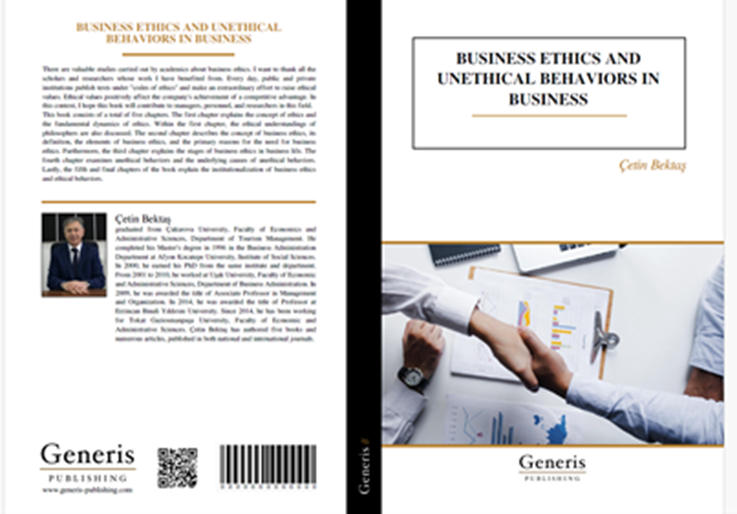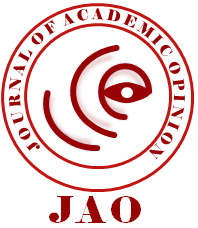Yazarımızdan Bir Mektup
Dergimiz Yazarlarından Prof. Dr. Çetin Bektaş tarafından editöre takımına teşekkür mektubu

Dergi Yayın Politikası
Journal of Academic Opinion (JAO) uluslararası hakemli dergi statüsündedir ve elektronik ortamda yılda iki sayı (Haziran ve Aralık) olarak yayımlanır.
JAO’da araştırma ve derleme makaleler, konferans raporları ve kitap eleştirileri gibi çalışmalar yayımlanmaktadır.
JAO’ya gönderilecek çalışmalar, alanında bir boşluğu dolduracak özgün bir çalışma niteliğinde olmalı ya da daha önce yayımlanmış çalışmaları değerlendiren, konuya dair yeni ve dikkate değer görüşler ortaya koyan bir inceleme olmalıdır.
JAO’da yayımlanan çalışmalarda yer alan görüşler yazar(lar)ın kendi görüşüdür, derginin görüşü değildir. Ayrıca yazıların bilimsel ve hukuki sorumluluğu da yazar(lar)a aittir.
JAO’ya gönderilen çalışmalara telif hakkı ödenmez ve yazar(lar)dan da ücret alınmaz. Yayımlanan çalışmaların telif hakkı Journal of Academic Opinion’a devredilir. Yazar(lar) dergi yazıları için bir "Telif Hakkı Formu" doldurup göndermekle yükümlüdür.
JAO’ya gönderilen çalışmalar daha önce hiçbir yerde yayımlanmamış ve yayımlanmak üzere başka bir platforma sunulmamış olmalıdır. Bilimsel bir toplantıda sunulmuş bildiriler, sunum bilgileri (kongrenin adı, yeri, tarihi vb.) açıkça belirtilmek şartıyla yayın için dergiye gönderilebilir.
JAO’ya gönderilen çalışmalar, elektronik ortamda derginin web sayfasından gönderilecektir. Söz konusu çalışma gönderildikten sonra hakem süreciyle ilgili gelişmeler ve hakem değerlendirme raporları editör kurulu tarafından yazar(lar)a e- mail yoluyla iletilecektir.
JAO’ya gönderilen her çalışma değerlendirme sürecine öncelikle editör tarafından kapsam ve diğer gereklilikler olan Türkçe ve İngilizce özet, yazım kuralları ile dergi makale şablonuna uygunluk göz önünde bulundurularak ön incelemeye tabi tutulmaktadır. İnceleme sonucunda değerlendirmeye uygun olmayan çalışma yazar(lar)a iade edilmektedir. Ön inceleme sonucunda uygun bulunan çalışma çift kör-hakemlik değerlendirme süreci başlatılmaktadır. Bu süreçte ilgili çalışma etik ilkeler çerçevesinde alanında uzman bağımsız iki hakeme hakem değerlendirmesi için gönderilmektedir. Hakemlik sürecinde yazar(lar)ın ve hakemlerin isimleri gizli tutulmaktadır. Hakemlere çalışmayı incelemek ve değerlendirmek için 15 gün süre verilir. Hakem değerlendirmeleri sonucuna göre çalışmanın dergide yayımı konusunda kabul, revizyon veya red kararı verilmektedir. Eğer çalışma her iki hakem tarafından reddedilirse değerlendirme süreci red kararı verilerek sonuçlandırılır. Ancak hakemlerden biri red diğeri kabul yada revizyon kararı verirse reddedilen çalışma, incelenmek üzere üçüncü bir hakeme gönderilir. Yazıyla ilgili nihai karar üçüncü incelemeden sonra verilir. Çalışma revizyon için geri gönderilirse, yazar(lar) revize edilmiş çalışmayı 15 gün içinde revize ederek gönderir. Editör ve / veya hakemler çalışmayı yeniden değerlendirir, önerilerini yerine getirilip getirilmediğini inceleyerek tekrar revizyon gerekli görülmesi halinde editör tarafından çalışma yazara geri gönderilir ve tekrar değerlendirilir. Son olarak, editör çalışmanın kabul edilip edilmeyeceğine karar verir. Yazar(lar) bu sürecin her adımı ile ilgili editör tarafından bilgilendirilir.
Değerlendirme sürecinde yazar(lar)dan çalışmalarına ilişkin bilgi ya da ham veri istenmesi durumunda beklenen bilgileri editör(ler)e sunmalıdır.
JAO’ya gönderilen çalışmalar etik kurallara uygun olarak hazırlanmalı ve metin içinde yapılan atıflar mutlaka belirtilmelidir. Yapılan çalışmanın benzerlik oranı yazar(lar) tarafından rapor halinde editör kuruluna sunulmalıdır. Kabul edilebilir benzerlik oranı üst sınırı %20' dir. Rapor denklemler ve kaynakça hariç şeklinde düzenlenmelidir.
Editör kurulu değerlendirme sürecinde benzerlik kontrolü yapma ve bu doğrultuda düzeltme isteme hakkına sahiptirler. Benzerlik oranı üst sınırının çok üzerinde olduğu tespit edildiğinde söz konusu çalışma editör kurulu tarafından reddedilir.
Editör kurulu gönderilen çalışmaların özgünlüğü kontrol etmek için yazar(lar) çeşitli “intihal kontrol” yazılımları veya programları (Turnitin ve iThenticate gibi) kullanabilir.
Gönderinin herhangi bir aşamasında (kabulden önce veya sonra, yayımdan önce herhangi bir aşamada) gerek hakemler gerekse editör kurulu tarafından intihal tespit edilmiş ise editör yazar(ları) ikaz ederek gönderinin yeniden yazımını ve/veya uygun atıfta bulunmasını talep edebilir. Eğer intihal oranı %20’den fazla ise çalışma reddedilebilir veya yazar(lar)ın bağlı oldukları kurumlarına söz konusu intihal oranı bildirilebilir. Eğer yayımdan sonra intihal tespit edilirse, bu durum okuyucu kitlesine dergide editör notu olarak açıklanır ve yazar(lar)ın kurumlarına bu ihlal oranı bildirilir.
Editör Kurulu, değerlendirme sürecindeki çalışmalarda telif hakkı ihlali ve intihal yapıldığını tespit ederse çalışmanın 15 gün içerisinde geri çekme işlemini gerçekleştirme yetkisine sahiptir. Geri çekilen yazı dergide ilan edilerek geri çekme işleminden sonra yayınlanan ilk sayıda geri çekilen yazı ile ilgili bilgi yer verilir. Ayrıca geri çekme nedeni derginin dizinlendiği kurum ve kuruluşlar iletilir.
Bilimsel Yayın Etiği
Journal of Academic Opinion (JAO), yayın sürecinin tüm aşamalarını etik ilkelere uygun olarak yürütme adına yayın etiği ve açık erişim politikası olarak Committee on Publication Ethics (COPE) tarafından yayımlanan rehber ve ilkeleri temel alan çeşitli politikaları benimsemiştir. Söz konusu politikalar yazar(lar), editörler, hakemler ve ilgili tüm süreçleri kapsamaktadır. JAO’nun belirlemiş olduğu bilimsel yayın etiği çerçevesince açıkça belirtilmeyen durumlarla karşılaşıldığında ismi geçen rehber ve ilkelere başvurulacaktır. Yayın sürecinde tüm aktörlerin etik ilkelere uyması gerekmektedir.
JAO’nun yayın süreci, bilginin bilimsel yöntemlerle tarafsız üretilmesi, geliştirilmesi ve paylaşılması esasına dayanmaktadır. TR Dizin tarafından bilimsel süreli yayıncılıkta etik güvence oluşturmak amacıyla hazırlanan ve JAO’nun da benimsemiş olduğu yayın etiği ve açık erişim politikası, yayın sürecinin tüm paydaşlarının kılavuz ve politikalar doğrultusunda etik ilkelere uyulması gerekmektedir. Yayın Etiği Komitesi’nin (COPE) “Dergi Editörleri için Davranış Kuralları ve En İyi Uygulama Rehber İlkeleri” ve “Dergi Yayıncıları için Davranış Kuralları” ilkeleri uygulanmaktadır.
Etik Kurul
TR Dizin 2020 yılı Dergi Değerlendirme Kriterleri kapsamında tüm bilim dallarında yapılan araştırmalar için “Etik Kurul Onayı” alınmış olması, bu onayın çalışmada belirtilmesi ve belgelenmesi talep etmektedir. TR Dizin Değerlendirme Kriterleri kapsamında Madde 8’de yer alan bu değişiklik üzerine süreci 2020 yılında başlayan etik kurul izni gerektiren çalışmalarda Etik Kurul Onayında yer alan izinle ilgili bilgilerin (etik kurul adı, tarih ve sayı numarası) çalışmanın yöntem bölümünde ve ayrıca çalışmanın ilk/son sayfasında yer alması zorunlu tutulmaktadır.
TR Dizin’in “Etik Kurul Onay” belgesi için belirlediği kriterler şunlardır:
1. Sosyal bilimler dâhil olmak üzere tüm bilim dallarında yapılan araştırmalar için ve etik kurul kararı gerektiren klinik ve deneysel insan ve hayvanlar üzerindeki çalışmalar için ayrı ayrı etik kurul onayı alınmış olmalı, bu onay çalışmada belirtilmeli ve belgelendirilmelidir.
2. Çalışmalarda Araştırma ve Yayın Etiğine uyulduğuna dair ifadeye yer verilmelidir.
3. Etik kurul izni gerektiren çalışmalarda izinle ilgili bilgiler (kurul adı, tarih ve sayı no) yöntem bölümünde ve ayrıca çalışmanın ilk/son sayfasında yer verilmelidir. Olgu sunumlarında, bilgilendirilmiş gönüllü olur/onam formunun imzalatıldığına dair bilgiye çalışmada yer verilmesi gereklidir. Araştırma makalelerinde verisi 2020 yılından önce toplanmış çalışmalar için ETİK KURUL İZNİ istenmemektedir.
Bu doğrultuda JAO’ya gönderilecek;
etik kurula ilişkin bilgilere yöntem bölümünde yer verilmesi ayrıca araştırma ve yayın etiğine uyulması gerekmektedir.
Editör Kurulunun Sorumlulukları
Editör Kurulu, yukarıda sıralanan sorumlulukların editörler tarafından yerine getirilmediğini tespit etmesi halinde ilgili editörün görevi sonlandırılır.
Hakemlerin Sorumlulukları
Editör Kurulu, yukarıda sıralanan sorumlulukların hakemler tarafından yerine getirilmediğini tespit etmesi halinde ilgili hakemlerin görevlerini sonlandırılır ve raporu/raporları iptal eder.
Yazar/ Yazarların Sorumlulukları
Editör Kurulu yukarıda sıralanan sorumlulukların yazar(lar) tarafından yerine getirilmediğini tespit etmesi halinde hangi aşamada olursa olsun çalışmayı yayımlamaktan vazgeçebilir. Çalışma yayımladıktan sonra söz konusu durumun tespit edilmesi halinde ise yayımlanacak ilk sayıda "Düzeltme Metni" yayımlanır.
Dergimiz Yazarlarından Prof. Dr. Çetin Bektaş tarafından editöre takımına teşekkür mektubu

Dergimiz yayın organı olarak
Uluslararası Katılımlı Ekonomi Araştırmaları ve Finansal Piyasalar Kongresi (IERFM),
İpek Yolu ve Ötesi Kongre Serisi” (SIRCON 2024),
4. Uluslararası Bankacılık Kongresi ve
20. Uluslararası MEEA Konferansında paydaş olmuştur.
Dergi Sahibi - Yayıncı
İlhan EROĞLU
e-ISSN: 2791-9447


Dergimizde yayımlanan makaleler, Creative Commons Atıf 4.0 Uluslararası (CC BY 4.0) ile lisanslanmıştır.
